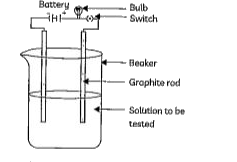Which of the following does not conduct electricity?
Fused NaC1
Solid NaC1
Birne solution
copper
The correct Answer is:B
To determine which of the following does not conduct electricity, let's analyze each option provided:
1. Fused NaCl:
- Fused NaCl refers to sodium chloride in its molten state. In this state, the ionic bonds are broken, allowing the Na⁺ and Cl⁻ ions to move freely. The movement of these charged ions enables the conduction of electricity.
- Conclusion: Fused NaCl conducts electricity.
2. Solid NaCl:
- In solid NaCl, the sodium and chloride ions are held together in a rigid lattice structure. In this solid state, the ions cannot move freely because they are fixed in place. Since electrical conduction requires the movement of charged particles, solid NaCl cannot conduct electricity.
- Conclusion: Solid NaCl does not conduct electricity.
3. Brine Solution:
- Brine is a concentrated solution of salt (NaCl) in water. In this solution, Na⁺ and Cl⁻ ions are dissociated and can move freely in the liquid. The presence of these mobile ions allows brine to conduct electricity effectively.
- Conclusion: Brine solution conducts electricity.
4. Copper:
- Copper is a metal known for its excellent electrical conductivity. The free-moving electrons in metals like copper allow them to conduct electricity very well.
- Conclusion: Copper conducts electricity.
Based on the analysis of each option, the correct answer to the question "Which of the following does not conduct electricity?" is Solid NaCl.
Summary of the Steps:
1. Analyze Fused NaCl: It conducts electricity due to free-moving ions.
2. Analyze Solid NaCl: It does not conduct electricity as ions are fixed in place.
3. Analyze Brine Solution: It conducts electricity due to free-moving ions in solution.
4. Analyze Copper: It conducts electricity due to free-moving electrons.
- Fused NaCl refers to sodium chloride in its molten state. In this state, the ionic bonds are broken, allowing the Na⁺ and Cl⁻ ions to move freely. The movement of these charged ions enables the conduction of electricity.
- Conclusion: Fused NaCl conducts electricity.
- In solid NaCl, the sodium and chloride ions are held together in a rigid lattice structure. In this solid state, the ions cannot move freely because they are fixed in place. Since electrical conduction requires the movement of charged particles, solid NaCl cannot conduct electricity.
- Conclusion: Solid NaCl does not conduct electricity.
- Brine is a concentrated solution of salt (NaCl) in water. In this solution, Na⁺ and Cl⁻ ions are dissociated and can move freely in the liquid. The presence of these mobile ions allows brine to conduct electricity effectively.
- Conclusion: Brine solution conducts electricity.
- Copper is a metal known for its excellent electrical conductivity. The free-moving electrons in metals like copper allow them to conduct electricity very well.
- Conclusion: Copper conducts electricity.
1. Analyze Fused NaCl: It conducts electricity due to free-moving ions.
2. Analyze Solid NaCl: It does not conduct electricity as ions are fixed in place.
3. Analyze Brine Solution: It conducts electricity due to free-moving ions in solution.
4. Analyze Copper: It conducts electricity due to free-moving electrons.
Similar Questions
Knowledge Check
Which of the following will not conduct electricity ?
AK+Cl− (Aqueous solution)BK+Cl− (Solid state)CNa+Cl− (Fused state)DGraphiteWhich of the following liquids can conduct electricity in pure state?
AWaterBMercuryCBromineDBenzeneWhich of the following can conduct electricity in?
AMgBr2BCaBr2CBaBr2DBeBr2
Which of the following objects can conduct electricity?
View SolutionWhich of following will not conduct electricity?
View SolutionWhich amongst the following will not conduct electricity?
View SolutionWhich of the following (1M) conducts more electricity?
View SolutionWhich of the following does not conduct current in aqueous solution
View Solution


